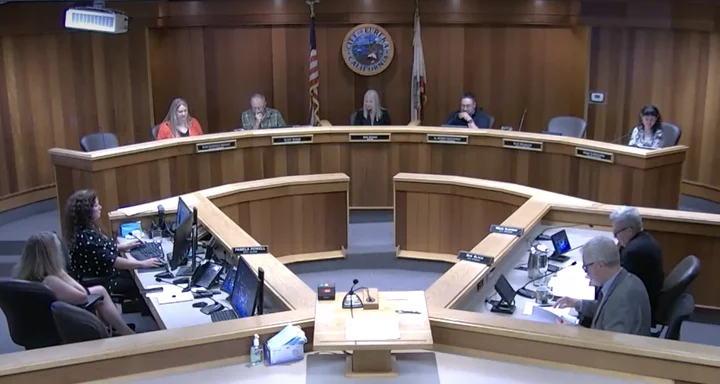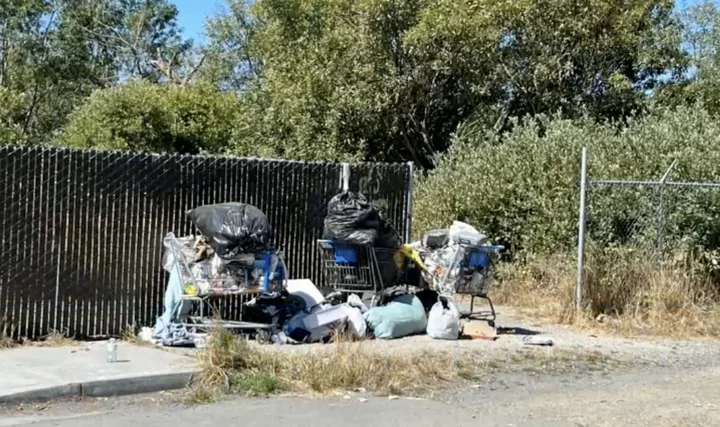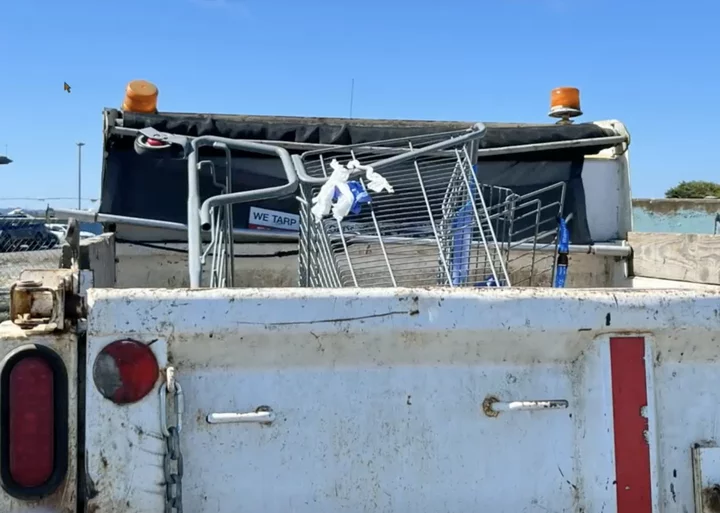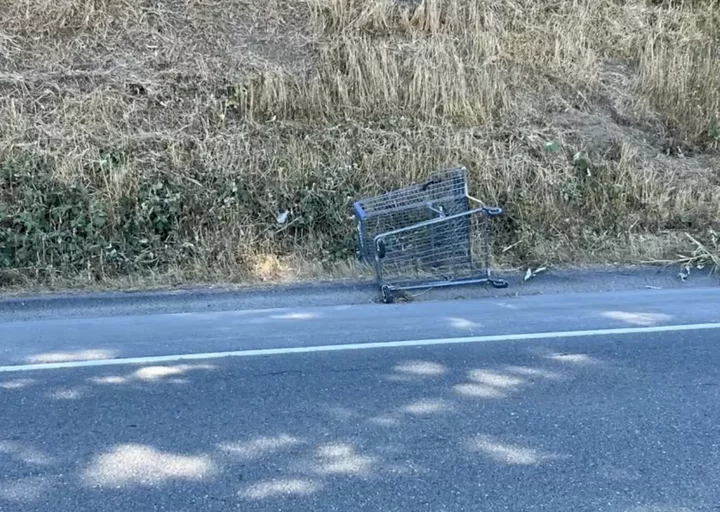Screenshot of Tuesday’s Eureka Council meeting.
###
The City of Eureka is rolling out a new program to address an uptick in stolen and abandoned shopping carts scattered around town.
At last night’s meeting, the Eureka City Council voted 3-1, with Councilmember G. Mario Fernandez dissenting, to advance an ordinance — linked here — that would allow staff to return abandoned shopping carts to the grocery stores and retailers that own the carts, rather than sending them to the landfill or salvage yard. The ordinance, if approved at the council’s next meeting, would implement a citywide tagging, tracking and billing system to hold retailers accountable for abandoned carts.
A group of abandoned Walmart shopping carts. | Photo: City of Eureka
Under the city’s current policy, retailers are subject to an $80.34 per-cart fee to cover the cost of retrieval and disposal, but it isn’t really enforced, according to Eureka’s Chief Building Official Brenden Reilly. The new ordinance would impose additional fees for business owners who fail to adopt deterrents against shopping cart theft.
“An abandoned cart fee is in place with the current policy, but from a practical perspective, we don’t get around to actually charging the fees just because of the number of people that are grabbing them and dropping them off at the corp yard,” Reilly said. “There’s a multitude of departments that are grabbing these things. … I mean, everybody’s working to get these things out of the public view. … It’s just a mess to keep track of, and we don’t have a good system in place.”
“Off to the dump with ye!” | Photo: City of Eureka
Under the new system, staff will zip tie tags to the carts and upload a picture of the tags into the city’s GIS system. Retailers with tagged carts will be billed at the end of each month.
“Additional fines can be levied against businesses that are repeat offenders,” Reilly continued. “It starts at $50 per incident, which is not per cart; it’s per however many we find in one spot, and then they can escalate from there. … The only change to the ordinance is an added provision that the fees for collecting the abandoned carts can be charged whether we return them to the business or dispose of them.”
Councilmember Scott Bauer asked why it’s taken so long for retailers to be held accountable for so-called shopping cart litter, noting that modern shopping carts often come with an anti-theft locking mechanism that prevents the cart from being wheeled out of a designated area.
Reilly said staff have asked retailers, many of whom are “big out-of-town corporations,” to hire someone to wrangle the carts, but “they just don’t seem to care.”
“It seems to be a cost of doing business,” Reilly said. “We’re trying to come back and try one more push [to] say, ‘Hey, can we get a handle on this?’ and hopefully we can get through to those businesses. Whether or not it’s going to work, I’m not sure, but at least we’ll have a way to recuperate staff’s time for having to deal with all of these carts.”
Development Services Director Cristin Kenyon added that most of the stolen carts are coming from corporate retailers, not local grocery stores.
“We just have some bad actors in businesses that really don’t care about their property getting stolen,” Kenyon said. “Our code enforcement manager would call all [the retailers], and some of them — like Eureka Natural Foods — would be like, ‘Oh, yeah! I want that cart! I’ll come and get it from you.’ The majority of [the carts] are from just a few of these businesses … and when we’d call the manager … they’d never show up to collect them, and then we were responsible for dealing with them.”
Still, Councilmember Renee Contreras-DeLoach expressed concern about the ordinance targeting local businesses. She also took issue with the prospect of charging any retailer — local or corporate — a fine for the return of stolen property.
“I understand the staff time involved, so I get that aspect, but I also just want to be cognizant and careful of not making things more difficult for businesses operating locally,” she said. “Granted, Walgreens is a large chain, but I know the employees there … [are] deeply frustrated at how frequently they’re the victims of theft.”
Another forsaken cart. | Photo: City of Eureka
Councilmember Leslie Castellano made a motion to advance the ordinance, which was seconded by Bauer, and thanked staff for amending the city’s policy to keep stolen carts out of the landfill.
After the motion was made, Contreras-DeLoach and Fernandez floated a few ideas aimed at reducing potential impacts to local businesses. Fernandez asked if penalties could be based on gross earnings or the locality of the business to target corporate entities rather than small businesses. City Attorney Robert Black wasn’t sure if that would be legal, but said he’d be willing to look into.
Contreras-DeLoach suggested a few freebie cart returns to reward businesses acting in good faith. “Maybe there could be, like, a minimum threshold?” she asked, adding that the city could charge retailers more per cart if they exceeded a certain threshold. “That would offset staff time, and it would deal with those larger offenders instead of dragnetting smaller groups.”
Castellano said she would be open to a friendly amendment to her motion, but wasn’t willing to make it herself. A few moments later, Bauer asked to “call the question,” a parliamentary procedure used to end a debate on an ongoing issue and bring the matter to an immediate vote.
The council approved the motion without a friendly amendment in a 3-1 vote, with Fernandez dissenting and Councilmember Kati Moulton absent. The council will make a final decision on the ordinance at its next meeting on Tuesday, Aug. 19.
###
What else happened at last night’s meeting? I’m glad you asked!
- The council unanimously approved a 9.45 percent increase for trash pick-up as a part of the city’s annual rate review and service rate adjustment for solid waste collection in Eureka. The service rate increase is higher than in previous years, largely due to recent wage increases for Recology staff. Staff recently determined that the city has overpaid for street sweeping by about $119,000 over the last decade, which brought the rate increase down from 10.6 to 9.45 percent. The council lamented the ever-increasing cost of living for residents, but acknowledged the importance of wage increases for Recology employees. The item passed in a 4-0 vote.
- The council also approved an appeal to a recent Historic Preservation Committee decision regarding the replacement of three mismatched doors on a former carriage house. The committee approved the request with a special condition that the applicant install a five-panel wooden door. The applicant, who wasn’t able to attend the committee’s June 4 meeting, appealed the decision to the city council, asking that she be allowed to install nine-lite wooden doors instead. Her request was approved in a 4-0 vote.
- The council also approved a small amendment to the city’s inland zoning code to accommodate a state-mandated update for accessory dwelling units (ADUs). The changes allow for up to eight ADUs with an existing multi-family dwelling, as long as the number of ADUs doesn’t exceed the number of units in the dwelling itself. The amendment also grants amnesty to unpermitted ADUS that were constructed before Jan. 1, 2020.
###




CLICK TO MANAGE